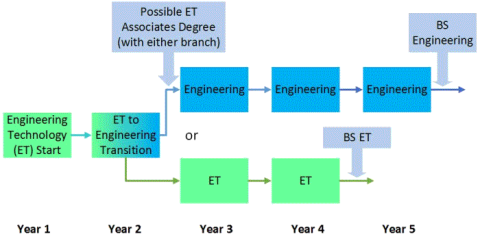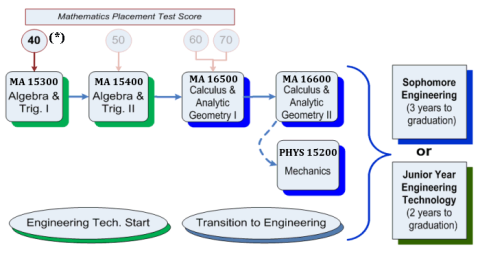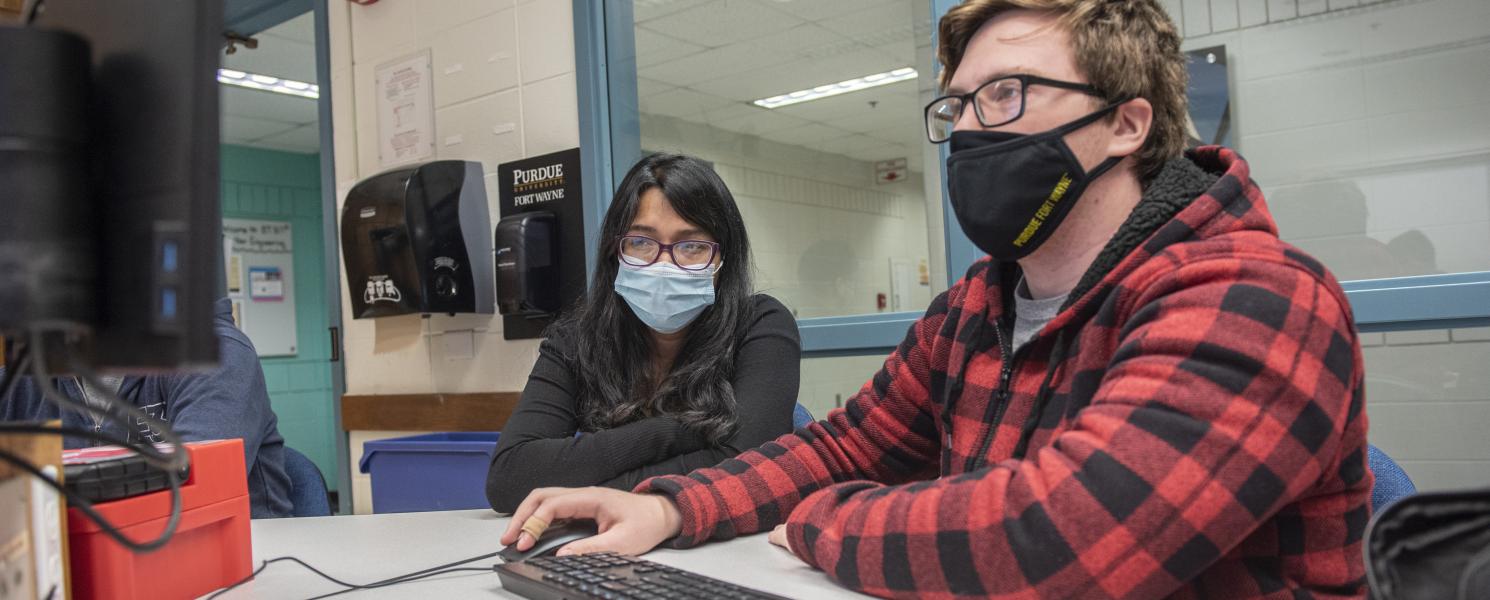
Student resources
Department of Electrical and computer engineering
support
The Herd is here for you.
You need what you need when you need it. We get that, which is why we offer loads of resources for every stage of your academic journey.



Advising
Your success matters.
Advisors keep you on track to graduate, and they’re also a great resource for things like creating class schedules, giving you insider info about campus, and getting you the help you need. Visit the College of Engineering, Technology, and Computer Science’s Student Success Center for all your advising questions.

Peer Support
Peer Support
From our LEAD peer mentors (junior or senior ETCS students who have a dedicated interest in helping freshmen and sophomores navigate the university and the engineering program) to the Help Corner (tutoring services for ETCS students offered by ETCS students), the support you need is always close by.
prospective ece students
Future Electrical or Computer Engineer
The Department of Electrical and Computer Engineering offers bachelor's and graduate degree programs, providing students with a high quality education to prepare them for success in their careers and communities. We offer undergraduate degrees in both Computer Engineering and Electrical Engineering.
Computer Engineering
You’ve shown interest and an aptitude for computing. You enjoy hands-on creation of devices that maximize the possibilities of their hardware components and software capabilities. You’re interested in working in telecommunications, robotics, embedded system or new product development. Computer Engineering could be the right fit for you.
Electrical Engineering
Electrical engineers helped invent the electronic circuits, motor/engine, power electronics, electronic-magnetic, industrial automation and control systems, and more.
Computer Engineering vs Electrical Engineering
While computer engineering and electrical engineering are two different fields, there’s a significant amount of overlap in responsibilities and areas of study. Both disciplines are equally technology-focused, lucrative and exciting. In the Department of ECE at PFW, you also have the option to pursue dual majors of Computer Engineering and Electrical Engineering.
Engineering is a profession in which knowledge of mathematics and science is applied with judgment to solve practical problems for the benefit of society. Engineers are involved in such diverse work functions as research and development, design of new products and processes, construction and operation of facilities, and management.
Engineering technologists must have knowledge of the materials and equipment needed to design, construct, operate and maintain technical products. They often estimate project costs, prepare work schedules and suggest ways to improve productivity. For instance they may perform computer analysis, provide measurements, and collect data. They identify safety and environmental concerns, and they specify ways to eliminate or reduce potential problems. Because they often coordinate people and assist with managing projects, technologists must understand decision-making strategies and problem-solving methods.
The Engineering/Technology Spectrum

Engineering and engineering technology majors are concerned with the full range of technical issues from design, development and theory through construction and operation. However, the engineering majors place more emphasis on the advanced design, development, technical management and theoretical end of this spectrum; while engineering technology majors focus on the manufacturing, routine design, construction and operation end. Because of this difference the engineering majors requires a significantly higher level of training in mathematics. Purdue Fort Wayne computer engineers majors earn a minor in mathematics automatically. Purdue Fort Wayne civil, electrical, and mechanical engineering majors can earn a minor in mathematics by taking one additional mathematics course.
Engineering and Engineering Technology Careers:
Two Different (But Overlapping) Paths

- Four degree programs: civil engineering, computer engineering, electrical engineering, and mechanical engineering.
- Classes are taught by skilled professors.
- Excellent professor to student ratio. Students enjoy personal attention from faculty.
- Faculty is focused on teaching.
- Active student organizations: ASCE, ASME, IEEE, SAE, and SWE.
- An innovative curriculum that emphasizes design projects “hands-on” laboratory experiences.
- The civil engineering, computer engineering, electrical engineering, and mechanical engineering programs are all accredited by the Engineering Accreditation Commission of ABET.
- Class schedules rotate between day and evening to accommodate working students.
- Co-op and intern programs. Students can earn money and gain valuable experience during their studies.
- PFW engineering graduates are in demand.
Welcome to Purdue University Fort Wayne’s joint Engineering and Engineering Technology Program. This 2 + 3 program is specifically designed to increase the options and success of students with mathematics placement score of 40, i.e. placement in MA 15300, and who are initially interested in an Engineering degree. Students start with a year of Engineering Technology coursework while they complete the mathematics preparation to start calculus. If they perform well and would like to move to engineering, their second year is a transition to engineering. At the end of this second year it will take three years to graduate in engineering or two years to graduate in Engineering Technology. In many cases students can also complete an associate’s degree in Engineering Technology.

The diagram below shows the required mathematics sequence and an essential physics course to get to sophomore engineering.
INTRODUCTORY MATHEMATICS SEQUENCE FOR JOINT ENGINEERING TECHNOLOGY AND ENGINEERING

(*) A Math Placement Test Score of 40 means placement in MA 15300.
Engineering is much more than mathematics. However, mathematics is an important tool and successful completion of the initial mathematics sequence is necessary to take most engineering classes. A “C -” or better is required to move on to the next mathematics course in the sequence; a C grade should be a warning that you are likely to have difficulty in the next course.
Students from varied backgrounds and with many different skills can be successful engineers. However, to become an engineer you must have an unusually strong interest and ability in mathematics and science, be able to study efficiently for long hours, and understand what you read. You should be curious about how and why things work. You must also be concerned with the social implications and consequences of everything you do.
In its current rankings of the best colleges and universities in the United States, U.S. News & World Report deemed the engineering programs at Purdue Fort Wayne to be one of the best undergraduate engineering programs in the country (of those that do not offer a doctoral degree).
Visits to Purdue University Fort Wayne are arranged through the Admissions office. Prospective students and parents can directly contact the Department of Electrical and Computer Engineering through email: [email protected] or call 260-481-6032 to arrange for a visit and a tour of the department at a mutually convenient time including evenings and weekends.
The main offices of the ECE Department are located in the Engineering and Technology (ET) building, ET 327.
FIRST-YEAR ENGINEERING
This is the beginning of your success story.
The First-Year Engineering (FYE) Program is dedicated to the success of all students and strives to create a strong bridge from high school to upper-level engineering and beyond. We have a team of dedicated faculty and staff who use a rigorous assessment plan to continue to grow and improve the program each year.
Our goal is to find the right path for each student whether it is within engineering, the College of ETCS, or beyond. Purdue Fort Wayne has many great student success resources to help students with the transition to college, navigate course work, and connect with their future careers. The FYE program highly recommends students utilize these resources early and often.
The College of ETCS Student Success Center organizes many beneficial programs. The Living Learning Community in student housing and the LEAD Peer Mentor program help new students gain valuable mentorship and friendships from other students in their majors. The Help Corner tutoring center provides free tutoring on core engineering classes throughout the school year. For more information about these resources, please visit the Student Success Center.
At Purdue Fort Wayne, all engineering students take a common first-year engineering curriculum. The 30 credits of engineering fundamentals, science, math, composition, and communication lay the foundation for their future engineering majors and careers. Each student’s path through the program may look differently depending on their starting math-level, their incoming credits, and their desired credit-load per semester. Students, under the guidance of their academic advisors, are encouraged to develop a personalized plan towards graduation that meets their individual needs while also adhering to the pre-requisite and co-requisite requirements.
The four-year plan of study for all engineering majors assumes a starting math level of Calculus I (MA 16500) or higher. Students entering the program at a math level of Algebra and Trigonometry II (MA 15400) will need at least 4.5 years to complete the full curriculum. Please see the major specific websites for detailed plans of study and bingo sheets.
All students starting at an Algebra and Trigonometry I (MA 15300) level who would like to pursue a degree in one of the engineering majors will be enrolled in the 2+3 program. The 2+3 program was developed to help students with less math and science experience develop a stronger foundation and build up to their rigorous upper-level engineering classes. Students within the 2+3 program will complete an augmented curriculum that starts with two years of engineering technology (ET) curriculum. Students can then choose to complete the remaining two years of ET curriculum or transition to engineering to complete the remaining three years of engineering courses.
To track your progress toward completing your degree requirements, you can check myBLUEprint. This tool isn’t meant to replace your advisor, so please be sure to meet with them each semester to ensure that you’re track. Access myBLUEprint from the Academic Success tab in goPFW.
Engineering is a rigorous and demanding degree program, but help is never far away. Visit the Student Success Center or the Help Corner whenever you need a little extra help. You’ll also have access to tutoring for any academic area through Purdue Fort Wayne’s tutoring services and testing centers.
In its current rankings of the best colleges and universities in the United States, U.S. News & World Report deemed the engineering programs at Purdue Fort Wayne to be one of the best undergraduate engineering programs in the country (of those that do not offer a doctoral degree).
ECE Academic resources
For undergraduate students.
Where you can find the information of curricula documents for Electrical Engineering and Computer Engineering, one-year ahead ECE Course Schedule and Technical Elective offering schedule, Undergraduate Registration and Advising, Senior Design, and more.
Each semester online registration will be blocked for ECE students until they meet with their assigned academic advisors and have an One-Year-Plan completed and signed by your advisor. This form can be completed using Microsoft Word and then be emailed to your academic advisor for digital signature.
Register early for classes! This helps with department planning. Some classes fill up early-students who register late may not get into some classes.
It is the student's responsibility to check co/prerequisite requirements and time conflicts. For accurate information about course co/prerequisite requirements, students should check these bingo sheets and/or Purdue Fort Wayne Catalog. The registration requirements and timetable are:
- Use these class schedules when building your one-year course plan.
- Students must bring a complete one-year course plan One-Year-Plan to the advisor, normally during their office hours.
- Students should bring a copy of their unofficial transcript to the advisor.
- After approval of the course plan by their advisors, students will be able to register online.
- If you believe your academic class standing (freshman, sophomore, etc.) needs to be updated ask your advisor to have it changed. Your academic standing is based on the number of completed credit hours, and it is separate from your progression within the degree program.
- If you are planning to graduate please apply for graduation. There are application deadlines for each graduation term, so be sure to check the Graduation website.
Students who are eligible for a minor in Mathematics and/or Physics should consult these webpages (Math, Physics) to ensure that the required forms are completed on time. For assistance or to have questions about minors answered, please contact the department that houses that minor. The Math Department is located in KT 200 and the Physics Department is located in KT 126B.
ECE 30200 can be used to satisfy the requirements of Math minor. Please contact Math Department to request MyBluePrint exception after you complete ECE 30200.
ECE 22900 and ECE 36800 may be used to satisfy the requirements of CS Minor. Please contact CS Department to make such requests after you complete these two courses.
- If you are having problems registering online (after having your one-year plan approved) please contact your advisor.
Note:
Your academic standing is based on the number of completed credit hours, and it is separate from the program progression within your ECE degree program.
Only relevant courses, i.e. they are in the bingo sheet, on your official transcript from the university are used in this determination of your program standing, specifically:
- 90 credits = Senior (before fall 2023)
- 90 credits (including ECE 36200) = Senior (for students admitted in or after fall 2023)
- 60 credits = Junior
- 30 credits (including PHYS 15200) = Sophomore
Submitting a Project Proposal
If your company is interested in sponsoring a senior design project, please fill this form and email it to Dr. Guoping Wang. Please read through this document when considering to sponsor a senior design project. Should you have questions or concerns in the meantime, feel free to contact the Department of Electrical and Computer Engineering Chair, Dr. Guoping Wang. Students need to sign a non-disclosure agreement and transfer of IP rights form. Please contact Director of Engagement, Sean Ryan for any legal questions.
Students eligible to enroll in ece40500 - sdi
As stated in the catalog, only students of senior standing in the program (number of credit hours >=90 including ECE 36200 for students who are admitted in fall 2023 on the bingo sheet of BSEE or BSCPE) can enroll in ECE 40500. After your one-year study of plan is approved by the academic advisor, please contact the department secretary for help with the registration of ECE 40500.
List of Current/Past Senior Design Projects
For students in the 5-year combined BS/MSE programs, upon satisfactory completion of the BSEE/BSCmpE degree requirements, the undergraduate degree will be awarded. The MSE degree can be earned subsequently. It is not mandatory for students to complete the 5-year BS/MSE program within five years.
Admission Criteria
Admission to the combined five-year BS/M.S.E program may be granted under the following conditions:
- Students must be enrolled in BSEE or BSCmpE program at Purdue University Fort Wayne and have not yet received an undergraduate BSEE or BSCmpE degree.
- Students must have finished at least 60 credit hours in the respective BSEE/BSCmpE bingo sheet.
- Students must have achieved an undergraduate grade point average (GPA) of at least 3.0 or equivalent in their major at the time of application.
- Have completed the mathematics sequence of courses equivalent to MA 16500 (Calculus I), MA 16600 (Calculus II), MA 26100 (Multivariable Calculus), MA 35100 (Linear Algebra), and MA 36300 (Differential Equations).
- Have completed the physics sequence of courses equivalent to PHYS 15200 (Mechanics) and PHYS 25100 (Heat, Electricity, and Optics).
- The area of specialization for M.S.E must be declared at the time of application.
- Acceptance into the program is conditional upon admission to the Purdue University Fort Wayne Graduate program.
- No Graduate Record Examination (GRE) score is required.
Application Process
Students that meet the admission criteria and wish to enroll in this 5 year BS/M.S.E program should consult with their academic advisor during the first semester of the junior year or earlier, and
- Complete and submit the Five Year BS/M.S.E Program Application and Form 27. Don't sign the forms and email the file to the department secretary Kathy. All signatures will be processed through DocSign.
- Update their Undergraduate Student one-year-course-plan accordingly.
- Complete the regular application to graduate school of Purdue University
- GS Form 27 and application to Purdue graduate school must be completed in the same semester.
Why can’t I register online?
All ECE majors will not be able to register online until they have met with their academic advisor and discussed their one-year course-of-plan for the next two semesters. Please check "Registration and Advising" for detailed information.
How do I find out who is my advisdor?
Go to goPFW. If you still can not find who is your advisor call the department secretary at 260-481-6362.
Why do I have to prepare a course plan? Do I have to follow it?
The curriculum has been designed to provide a careful buildup of skills and knowledge to become a successful engineer. It is crucial to take courses in a particular sequence. Many engineering and science courses are not offered every semester and often there is only one section. To ensure a steady and a successful progress towards graduation it is very important to have a plan and follow it as close as possible. Always check with your advisor if you can not follow the agreed course plan.
I am planning to graduate next semester, what should I do?
Please make an appointment to see your academic advisor before the next semester starts. Graduation application is located in goPFW under Enrollment, then Registration tools.
How do I know what my class standing (freshman, sophomore junior, senior) is?
Your class standing is based upon progress made toward completing the requirements of your engineering degree program. Therefore, you earn sophomore standing after you have successfully completed a quarter of the degree requirements; Junior standing after you have successfully completed one half of them; and Senior standing after successful completion of three quarters of those requirements. Only relevant courses, i.e. they are in the bingo sheet, on your official transcript from the university are used in this determination, specifically:
- 90 credits = Senior (before fall 2023)
- 90 credits (including ECE 36200) = Senior (after fall 2023)
- 60 credits = Junior
- 30 credits (including PHYS 152) = Sophomore
Naturally, this answer assumes that you know the requirements for your degree program. Note that filing a plan of study and updating it regularly will assist you in this process.
When I started at PFW, the course plan for my major required an elective course that no longer exists. I have not taken that course yet. What should I do?
Because of advances in technology engineering curricula are always subject to change. When changes occur every effort is made to not penalize students who are following an outdated course plan. For every course that is no longer offered there is an equivalent course(s) that can be taken. Every course that was taken following the old curriculum will count towards graduation and there is no need to take the new equivalent course(s). Please contact your academic advisor to request MyBluePrint exception for the courses not offered.
When preparing my course plan using the online schedules, I noticed that there is a time conflict between courses that I am supposed to take in the same semester. What should I do?
Every effort is made to avoid this type of conflict. It should not exist. If you notice this problem contact your academic advisor or the department chair and they will resolve it. If the time conflict is between ECE and science courses it might take some time to have the problem resolved since it requires coordination with another academic department.
I have a degree from Ivey Tech (or have taken courses there). How much of that course work counts toward an engineering degree?
Purdue University-Fort Wayne's Admission Office produces a credit transfer report that shows for each course taken in Ivy Tech what is the equivalent Purdue Fort Wayne course. Using this report the ECE department can determine how much of the course work at Ivy Tech counts towards an Electrical and/or Computer Engineering degree.
As an engineering student I have to take several math courses and programming courses. What can I do to get a minor in mathematics and/or computer science?
For requirements about how to earn a minor in mathematics please refer to the Undergraduate Catalog (formerly known as Bulletins) and Minor in Mathematics. To be officially awarded a minor in math a form must be filled and approved by the Math Department prior to graduation.
Students planning to earn a minor in mathematics are advised to directly contact the Math department.
For requirements about how to earn a minor in Computer Science, please refer to the Undergraduate Catalog.
Students planning to earn a minor in mathematics/CS are advised to directly contact the Math/CS department.
ECE 30200 may be used to satisfy the requirements of Math minor. Please contact Math Department to request MyBluePrint exception after you complete ECE 30200.
ECE 22900 and ECE 36800 may be used to satisfy the requirements of CS Minor. Please contact CS Department to request MyBluePrint exceptions after you complete these two courses.
As an engineering student, I take PHYS 152 and PHYS 251, what can I do to get a minor in physics?
For requirements about how to earn a minor in physics, please refer to the Undergraduate Catalog (formerly known as Bulletins) and Minor in Physics. To be officially awarded a minor in physics, a form must be filled and approved by the Department of Physics prior to graduation. This form is available at the Department of Physics.
Students planning to earn a minor in physics are advised to directly contact the Physics Department.
What laptop is the best for this program?
ECE does not require a laptop. Minimal System Requirements:
- Window 10, 64bit
- 3.3 Ghz or higher CPU
- 16 GB ram or more
- Solid state drive
What does academic dismissal mean?
Regardless of the circumstances, a student who has been dismissed from the ECE department must not enroll at PFW until one fall or spring semester has passed. When you miss a major semester, you just go through the admissions process again. This means when you decide to return to campus you must reapply to the university and be re-accepted. If you are readmitted to the university, you must go through an orientation process prior to re-enrolling in courses. For more information, please go to: https://www.pfw.edu/senate
How many course credits should I take each semester?
Engineering students at Purdue Fort Wayne are constantly over-committing themselves with too many course credits, too much work, and too many other commitments with family, friends, and their community. Setting realistic course and work loads is essential for succeeding in the program. So how many course credits should they take? Well it depends on how many hours a week they plan to work. The following table can be used to estimate how many credits are realistic to take based on hours of work per week.
| Hours of Work per Wk | 10 | 20 | 40 |
|---|---|---|---|
| Max Credit Load | Full Load (15 Credits) | 12 Credits | 8 Credits |
How do transfer credit from another university?
For additional questions and transfer support follow this link -
Transfer Students - Purdue Fort Wayne (pfw.edu)
- Apply to Purdue Fort Wayne’s ECE department using this link by creating an account and selecting Undergraduate Transfer or Returning. - Purdue Fort Wayne Application (pfw.edu)
- Be sure to provide ALL transcripts from each higher education institution to receive credit. High School Transcripts cannot be in place of a College or University transcript.
- As a transfer student, you must have an overall GPA of 2.0 (on a 4.0 scale) from the college you attended most recently to qualify for admission to Purdue Fort Wayne.
- Complete any additional placement tests to prepare for registration.
- Submit transfer credit that has not been evaluated through the TES system using this link to ensure all credits are applied where necessary. - TES Public View: PURDUE UNIVERSITY FORT WAYNE (collegesource.com)
- Visit campus and set an appointment to meet with ECE Department.
- Attend a new student orientation at provided times.
- Once accepted, schedule an appointment with your academic advisor to register for courses.
Prospective and current students please review M.S.E. Program Guidelines.
Each semester the ECE Department will put a registration hold on all MSE students. MSE students need to send their advisors a list of courses they plan to take the next semester and get the approval before this department hold can be removed.
Students should prepare a Registration Advising Form, discuss with their faculty advisor about the courses to be taken in the coming semester and their progress towards their plan of study. Once the faculty advisor approves the courses, the completed Registration Advising Form should be returned to the administrative assistant, who then will lift the hold and the students will be able to register online.
Note:
- It is the student’s responsibility to check course offerings, co/prerequisite requirements, and time conflicts.
- Please use Acrobat Reader to edit the fillable Registration Advising Form and save it as a pdf file, and then email it to your advisor.
- If you are planning to graduate in the coming semester, please make sure that the plan of study is filed and approved online before the start of the semester and graduation application is done before the deadline.
Preparing Plan of Study
All Master’s students are advised to file a draft of plan of study early in their program. If necessary, changes can be made to the plan of study at a later date. The plan of study must be appropriate to meet the needs of the student’s chosen area of concentration as determined by the advisory committee. The plan of study must be approved latest before the start of the graduating semester.
Procedure
The plan of study must be filed online through the Purdue Graduate School Web Database, which can be accessed through http://go.pfw.edu under the “Academic Success” tab via the Graduate School Plan of Study link.
The following are guidelines and instructions to prepare the plan of study.
- Review the list of graduate-level courses to determine the degree requirements for the particular area of concentration you wish to pursue, and the courses of most interest to you which will enable you to meet the degree requirements.
- Only 500-level courses and above can be used in the plan of study.
- Fill out a draft of your plan of study (preliminary).
- If you are a thesis option student, select an engineering faculty member to be your major professor who will also serve as the Chair of your graduate advisory committee. Then, in consultation with your major professor, select the remaining faculty members to serve on your graduate advisory committee.
- If you are a non-thesis option student, select your major professor with the Director of the graduate program.
- Confer with your advisory committee for advice on the plan and submit your plan of study.
Please visit the detailed instruction before you file online plan of study. A primer file has been prepared for your reference.
Your plan of study will be reviewed by the Director of the graduate engineering program to ensure that it meets all requirements. It will then be submitted to the Purdue Graduate School for final approval.
Filling Plan of Study
- The department code is “ENGR” and the degree code is “MSE.”
- The thesis or non-thesis option box should be checked.
- The space for indicating the research area is left blank in most cases.
- The area of concentration should be one of the following: Computer Engineering, Electrical Engineering, Mechanical Engineering, Systems Engineering. The AOS code should be left blank. Only First Concentration is needed.
- Only list the four core courses in your concentration area as “primary” area courses. All other courses are “related” area courses. The “Course currently being taken or those previously completed...” link will bring up a list of courses for which you have already registered.
- If you have courses to transfer from another institution to Purdue, select the second “Transfer courses...” link on the main course page. Transfer courses must be “B-” or better equivalent, not used for a degree elsewhere, and at graduate level. Course names should be entered exactly as they appear on the transcript from that institute.
- Enter courses to be taken in the future at Purdue using the third “Courses to be taken in the future...” link. Enter the information exactly as it will appear on the Purdue transcript.
- If you are in an approved combined degree program, for example, the combined BS/MSE degree program at the ECE Department, use the “Purdue Combined Degree...” link to add the 500-600 level courses to be dual counted between the Purdue undergraduate and graduate degrees.
- Please note that ECE 69800 M.S. Research Thesis should not be listed on the plan of study.
- When adding Advisory Committee, for each member of your committee, designate the participation level of that member, and enter their department and faculty ID. The faculty ID code can be found through the search faculty function on the page.
- Please note that non-thesis option students can have as few as one committee member, whereas thesis option students require at least three members.
- You can add notes (e.g., the number of research credits you expect to take, approved substitutions, etc.) via the “Comments and Special Notes” link.
- Click “Save without Submitting” to preserve the information entered for editing at a future time.
- If you would like your advisory committee to see your plan while you still have direct access to make changes, click the “Submit as Draft” button.
- If all key components have been included on the plan, click “Submit as Final.” This will submit the plan for signature. Students must submit their plan as “Final” and receive all department signatures on the form before the start of the session of anticipated graduation.
Limited graduate teaching assistantships may be available for MSE students. Please contact the department if you are interested.
If you wish to take an engineering graduate level course without enrolling in the degree program please list your educational goal as non-degree while applying.
MSE students at Purdue Fort Wayne campus are able to take online courses from Purdue West Lafayette campus and count those courses towards their plan of study. Please contact Purdue EPE office using general email address [email protected] if you have any questions.
If you have general questions about the M.S.E graduate program, M.S.E Degree in Computer Engineering, or M.S.E Degree in Electrical Engineering, feel free to contact Director of the Department of Electrical and Computer Engineering Graduate Program, Dr. Chao Chen.
If you have questions about M.S.E Degree in Systems Engineering please contact Dr. David Cochran.

Faculty Office Hours
Faculty Office Hours
Need to contact a faculty member? Looking for the best time to drop by their office? Check out the ECE faculty office hours chart.
If you have been academically dropped from Purdue Fort Wayne and wish to reapply, you should review the following information carefully. This material will help you understand the readmission process and requirements to get you back on track to Purdue Fort Wayne.
Readmission to the electrical engineering or computer engineering program is not automatic or guaranteed, and it’s your responsibility to understand and complete all the steps in the readmission process.
There is no appeal process for academic dismissal. Make sure that all your assigned grades are accurate. If a grade is changed because of a reporting error, your GPA will be recalculated, which may affect the drop decision.
You may be eligible for an exception if
- you have 15 or fewer credit hours to complete your degree and can take all your remaining courses in a single semester, and
- there are extenuating circumstances beyond your control, such as serious health issues.
A student is allowed to attempt ENGR 12700 Engineering Fundamentals I and ENGR 12800 Engineering Fundamentals II only three times, each. This includes all attempts that have earned a withdrawal, letter grade, or pass/no pass. If a student fails to earn a successful grade (C– or higher or pass) after three attempts in either course, the student is removed from the mechanical, civil, electrical, and computer engineering programs at Purdue University Fort Wayne and is not eligible for reentry.
Academic Resources
The support you need.
Your education is not a singular pursuit, and we recognize that. You’ll have plenty of support from the Mastodon community.




